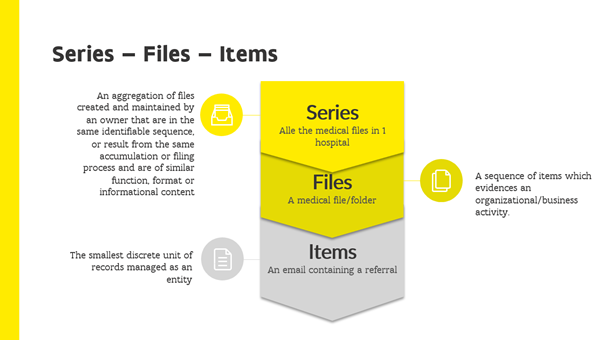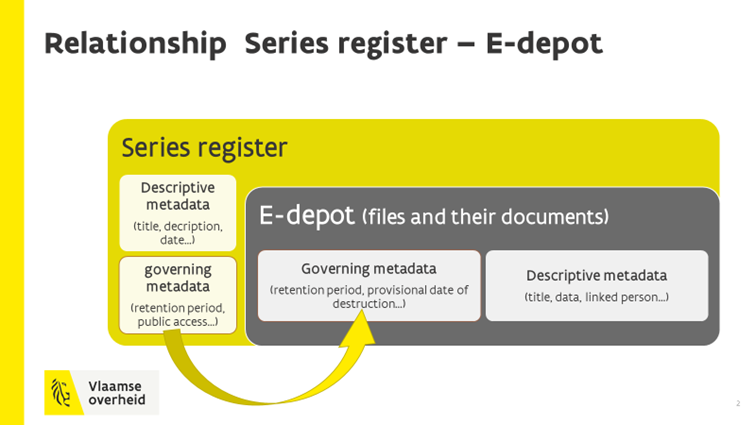Koen Dobbelaere & Quincy Oeyen work at Digital Archives Flanders for the Agency for Facility Operations of the Flemish Government
The expanding digitization of the government brings new challenges regarding the management, the (long term) preservation and the disclosure of digitally created or digitally received information. To tackle these challenges in an efficient way Digital Archives Flanders uses the concept of ‘series’. We define a series as: “An aggregation of files created and maintained by an owner, in the same identifiable sequence, or the result from the same accumulation or filing process, and of similar function, format or informational content”.

To give this concept, as defined above, a broader base in government institutions all over Flanders, it was embedded in Flemish law with decrees in 2010 and 2018.
Both the Decree on Archives of July 9th 2010, and the Decree on Governance of December 7th 2018 required that all governing bodies, as mentioned in article III. 79 of the Governing Decree, must publish all their categories of administrative documents. This publication has to be made in the central register, which is owned and managed by the Flemish Government, more specifically by The Agency for Facility Operations (since 2019). The regulator has the following objectives with this central register:
-
A central system for disclosing all information from the Flemish Government.
-
Stimulate accessibility to government information in order that the public could gain more insight into the information owned by the government.
-
Publicize approved rules for selection.
The concept of series is used in various ways in the regulations. First, it is used to describe information and to put it in context. Secondly, it is used to establish certain management rules (e.g.: retention period and destination). Thirdly, series can also be used to manage access rights and serve as a guide for setting up and structuring information systems (e.g.: a Document Management System).
An example of this third use can be found in the way the Agency for Domestic Governance, within the Flemish government, has structured its information systems. All series within the Agency have been mapped and each series is linked to a process as defined in the process folder. In order to allow government personnel to collaborate in a simple way within the information system (in this case, SharePoint), it was decided to overlay the information structure used on the mapped series.
Government personnel can always find information perfectly within the context of a clearly defined process. By defining the series such as 'files of civilian honorary marks' and 'files of national orders', they know they could retrieve all information from the processes 'issuing of civilian honorary marks' and 'granting of a national order' and must save them at that location. At the same time, the information manager knows perfectly what the management rules for this information are, and because this information is also nicely accommodated in different technical environments (in this case two different SharePoint libraries), these management rules can easily be applied at the level of the entire environment (in this case a SharePoint library).
In addition to the application for a Series register, Digital Archives Flanders launched a digital repository called the E-depot in March 2020. The core objectives of the E-depot are managing, storing and accessing digital government information in short and long term. There is a strong link between the Series Register and the E-depot. In the E-depot, files and their documents need to be linked to a published series from the Series register. Governing metadata of the chosen series will be inherited by the files as standard. These include for example:

The legal and / or administrative retention period
The period chosen at the level of the series determines how long a file must be kept in the E-depot.
Destination at the end of the retention period
When making a selection for permanent storage at serial level, the files are permanently stored in the E-depot. In case of a choice for destruction, the files will be destroyed after the end of the administrative or legal retention period and only after approval of the owner of the series. When choosing a sample, a selection is saved on the basis of the sampling rules decided upon at the serial level and the other files are destroyed. Just as with destruction, a sample only occurs after approval from the customer.
Public access to the files and the documents
Eventually government information is made accessible for the public through a Civil Portal. Based on the choice made here at the serial level, a citizen will or will not have access to the files in the future public portal of the E-depot. If it is decided not to make the files public, citizens can always request access, but the government managing the series can fall back on legislation from the Administrative Decree to refuse access to the files.
It is important to know that the inheritance of metadata from the serial level to the file level is breakable in the E-depot. With regard to an individual file within a series, it is possible to choose a longer retention period or not to make the content public.
